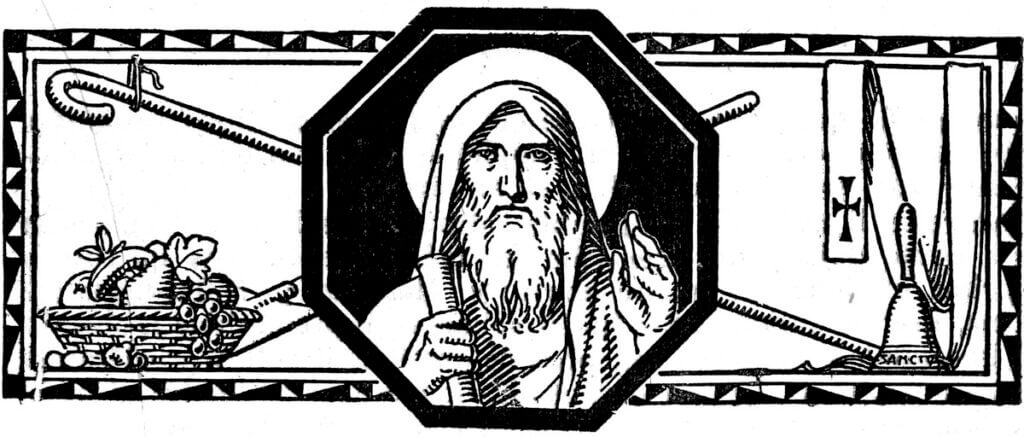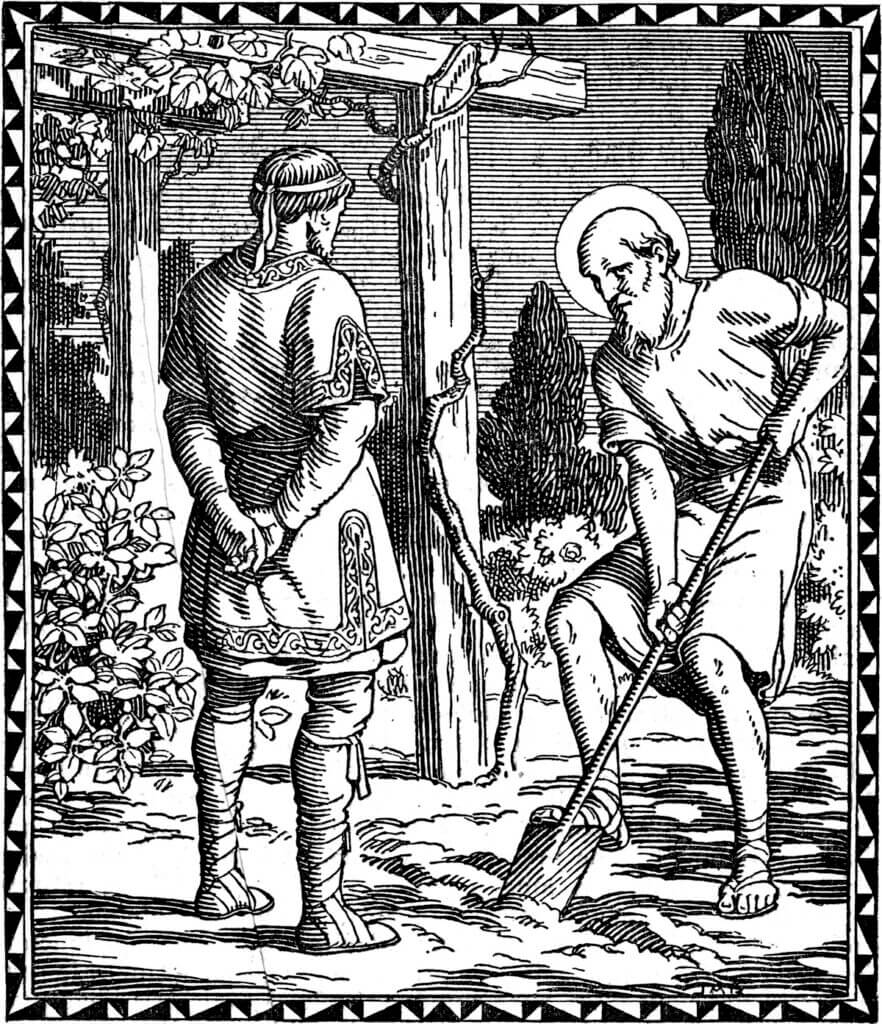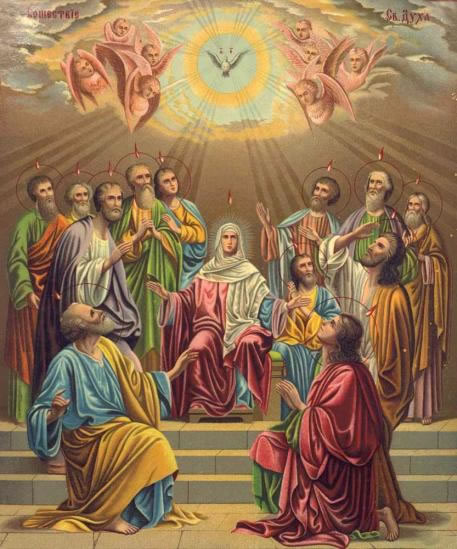To ive century lived in Bordeaux an illustrious family, orirginary of Rome, that of Pontius Paulinus, former pre-fect of Gaul; it’ belonged to her the noble Paulin whose life we would like to esquisiate. ’'s life is all the more interesting because, if it predicts a few imposed chroannohlous differences to be solved, Paulin himself has filled in his writings the most circumstantial details. The great stages are moreover certain’s: thirty-six years of play and of mondaine life; forty-two of Christian life, priestly and episcopal, sanctified by the practice of the highest vers, who assure the converted’illus an empire over demons and attract him the praise of the greatest Saints; Ambrose, Jerome, Augustine, Gregory the Great.
Youth of saint Paulin. – His successes in the world.
It is therefore in Burdigala or Bordeaux that, around 353, Pontius Meropius Anicius Paulinus was born, better known in history as Paulin. His parents, who were Christians, dedicated him to St. Felix of Nole; unfortunately, following a use then too widespread, they refused to have him baptized.
As soon as’il was old enough to study, Paulin followed the courses of the’ University of Burdigala, where he had for teacher Ausone, the most famous rhetorician of his time. The master took a paternal affection for this young student, whose he noted the heinous dispositions, and he remained attached to him all his life, rejoicing in his success, even as these threatened to’ eclipse its own fame. So it was not without regrets that’il left him, when’ in 368 he had to go to Trier, called by Valentinian Ier to the functions of preceptor of Gratian, the young heir of the’empire. Paulin, then fifteen years old, expressed these regrets and contierned his evades with new masters; he then applied himself above all to philosophy, the naturelle sciences and law.
Moreover, he did not hesitate to undergo the’attraction of Rome. He probably already felt for this city the same feelings that’Ausone expressed one day in four words: « My heart, in Burdigala ; in Rome, my veneration. » His studies completed, he therefore takes the chemin of the capitale of the’empire, and, almost soearly, he sees the career of public charges open before him. Governor of the’Epire and prefect of Rome perhaps, he is certainly a superior consul in 378, then he enters the Senate and, in 380, the vow named gourever?neur of Campania.
Thus, barely twenty-seven years old, Paulin is at the height of human honors and a brilliant confession seems to him assuaged, he said, when suddenly a frightful tragedy comes to annihilate all these hopes. On June 25, 383, the’ emperor Gratian falls under the blows of an assaultsin armed by Maximus, which the legions of revolted Brittany have raised to the’empire. In this sad conjuncture, Paulin believes he must bow to circumstances. In order to protect his family from the reprisals of Maximus, he left the service of the’ emperor and returned to Aquitaine.
Voies providentielles. – The stages of’a conversion. – The baptism.
It was in Burdigala that Providence was waiting for Paulin. Already at the beginning of his visit to Campania, a first call S’ was heard. Paulin had fixed his resignation above all on Nole. Now, one day, while he was attending the feasts of Saint Felix, he had felt a prodh impression :
At the sight of the admirable works performed in your sanctuary, will he be written in his 13the chanting in honor of Saint Felix, I believed with all my heart in the veritable God and I’uvris my soul to the love of Christ.
It had been consacrcre of new birth to the martyr of Nole, had made repair the road which, from the city, led to his tom ⁇ beau and, next to it, the latter, he had built a hospice for the needy It was then only’a spark, but which, after having sunk for ten years in the heart of the young patrician, was, there will finally light the flame that will consume him without return.
God will moreover reiterate his calls. This’ is ain ⁇ si that’obligated by the duties of his charge to’ to go to Rome rather souvent, the gourosverneur of Campania, saw there Saint Jerome or at least in inten ⁇ dit to speak with enthourosiasm. There he learned the generosity of Melanie, his relative, who had left everything to lead monastic life in the East ; he renounced the noble Paula and was witness to the angelic life practiced by the matrons of the’Aventine; he noted without difficulty the defiant triumph of Christia's, without difficulty, supported by the edicts of Gratian.
All this’emut, toucha and’inclina more and more towards the religion that’ attracted it. Gratian's death was the coup de grace, but six more years had to pass before the final conversion.
The first years of Paulin's retirement in Aquitaine were troubled by many anxious ones. Suspect to the’usurper, the’ancien gourosverneur of Campania saw for a moment his confiscated property and had to make several trips to put order to his business. Sweet Providence used all these occurrences to move it little by little towards practical faith. During a trip to Spain, she saw that’he would meet a young Spaniard, named Therasia, who was Christian, and that’il would marry her. Another time, passing through Vienna, Paulin saw St. Martin of Tours, and the venerable bishop ford him miraculously and suddenly an evil of’. In Milan, the divine’action became even more visible. Paulinus knew Saint Alype, a friend of Saint Augustine, and was the future bishop of’Hippo himself. Especially,he frantically visited Saint Ambrose, coming like him from the ranks of the patriciate; he had with the’illus pontiffe repeated entretins and assisted him to the instruments that he gave to the people. Also he will write later : « J’ai always been loved by’Ambroise, and it’ is he who nourished me in faith. »
Strangely enough, these interviews with Ambrose did not’ any immediate results, and Paulin hesitated again leaning two years to make the last step. Too many links L’ still attached to the world. Staying early in Burdigala, early in one of the proscprieties of’alentour, he entered into frantic relations with Ausone, his former master, who, after the death of Gratian, had retired to Saintes, he, and he was like’a court of devoted’amis, through which he was holed up in the first rank, after Ausone, Sulpice-Severe, the future historian of the CHURCH. On the other hand, his riches allowed him to enjoy all legal pleasures, and his exquisite urbanity loved him by all. Finally, he had preserved a pro-unknown taste for pagan letters. Fortunately for him,he went back to the’ study of the phi ⁇ lo ⁇ sophie; he finally understood the rights of God over the’ man, he said, as well as the necessity of intergral christia and it came to this conclusion that’ it will later in these terms : « J’ai beaucoup studied, i’ai parcouru the cycle of all the sysctems and I’ nothing better than to believe in Christ. » The’work of grace contianua with the heartfelt and tactful exhortations of two Saints whom’il liked to count among his friends: Delphin, the’bishop of Burdigala, and Amand, venerable priest of the city and future pastor of the diocese; with the incursions repeated without being imported from Therasia, and Paulinus decided to receive baptism. At the last moment, Satan tried to make everything fail. Maximus, defeated by Theodosius, having died,the demon suggested to Paulin the inclination that, if’il condemned him, he could resume his rank at court. Thanks be to God, the converted cow, feeling himself arrived at the port, did not want to throw himself back into the open sea, and he generously triumphed over the temptation. Delphin and Amand therefore pre-prepared him for baptism, and the cereal-mohnia was made at Burdigala in 389.
Saint Paulin withdraws to Spain. – He is ordained priest.
From then on, Pauline's ascents in the ways of perdition will be constant; he made, he said himself, as « the voyager who, advancing always and never receding, never receding, one day insensibly reaches the border and fran ⁇ chit ». Leaving the pagan muse, who could no longer charm his disheveled spirit, he turned to Christian poetry. He put in verse many psalms, a life of St. John the Baptist and three admirable prayers, where he deplores his indifference. He left the bar, withdrew to the country, reduced his way of life and became more of his wealth than to do good around him. A way of life so little ordinary could not fail to’ attract to Paulin the most acerbic criticism. His manly friends haughtyly reproved them ;his comipartriots laughed at him, and their backs came to him. Ausone himself went so far as to reproach him for bowing under the yoke of Therasia.
No longer, therefore, piercing in Aquitaine the peace and rest to which he aspired, Paulin took the opportunity to seek them in Spain, where he was less known, and he retreated to Barcino, today’ Barcelona. He arrived in the neck of the year 390 and lived there three or four years. Two tests came during the’y to reach. In 392, Valentinian II was assasigned by Arbogastus and, according to Bishop Lagrange, Paulin's brother was one of the victims of this dismissal. Very affected by this death, Paulin was still affected by what this brother had experienced without leaning enough to the salvation of his soul. Also, in a letter that’il wrote to this occurrence to Delphin and Amand, he confided to them his fears, by admonishing them to pray so that God may cause wrath to the deceased. Some time later, though,a new mourning came to frighten him. He had always desired the joys of fatherhood, and the Lord had at last granted them to him; but this longed-for son lived only eight days.
From now on, detached from everything, the noble patrician N’ will aspire more than’ to the evangelical perversion. In agreement with Therasia, he no longer wished to live with her as with a sister, he put on his hair and put on the robes of the monks, then he thought of retiring to Nole, near the tom ⁇ beau of Saint Felix. He wrote to St. Jerome. The solidary of Bethlehem told him and told him to divest himself of his possessions and to devote himself to the study of the Holy Books. Paulin soon took up the work and handled the liquidation of his estates in Spain. When the people of Barcino got wind of these projects, they tried to frighten the’ execution. On Christmas Day 393, Paulin and Therasia attended the offices of the cathedral. All of a sudden,the faithful rise up and superplease the’bishop to confer on Pauline priestly’ordination, hoping otherwise to fix it in the middle of’ux. Paulin resisted first of all, judging himself unworthy of’ such an honor. He gave in and allowed himself to be ordered, but to the condition that’il would not be attached to Barcino's clergy. By giving Delphin and Amand his election to the priesthood, he was willing to offer the’ support for their prayers, because, he read, he read, « I will be your joy if to the fruits that I will wear one must reconnect me for a branch of your tree ».By giving Delphin and Amand his election to the priesthood, he was willing to offer the’ support for their prayers, because, he read, he read, « I will be your joy if to the fruits that I will wear one must reconnect me for a branch of your tree ».By giving Delphin and Amand his election to the priesthood, he was willing to offer the’ support for their prayers, because, he read, he read, « I will be your joy if to the fruits that I will wear one must reconnect me for a branch of your tree ».
Paulin was only able to leave’Spain after the Easter holidays of’an 394. Instead of going straight towards’Italy towards the Mediterranean, he will go back to Gaul, where he lives by walking past Narbonne Sulpice-Severe, who wanted to follow him, then he went to Florence, where Saint Ambrose was then holed up. The old bishop received him with open arms, and’a aggrandized him to his clergy, while allowing him freedom to resign wherever he pleased. From Florence, Paulin s’achemina to Rome. Welcomed with contempt by the pagan senateurs, his former colleagues, angryly by Pope Siricius, who irregularly disturbed his predicent ordination and its situation with regard to Therasia, the, he was received with enthousiasm by the friends of St. Jerome and St. Paul. It is easy to understand what’en such conjunctures,he did not intend to plan his stay in capitality. So he hastened to descend into Campania and to head towards Nole; he arrived at the environs of autumn’.
Saint Paulin in Nole, – Monastic life.
It was a joy for the inhabitants of the city, who still repressed the manners with which he had admired the province fifteen years ago; the’bishop of Nole, Paul, and, L’authorized to settle near the tom ⁇ beau of Saint Felix. At the height of this tom ⁇ beau, Paulin had built, we have said, a hospice for the needy. He’ raised him from’a floor, S’en reserved a wing for him and his companions, yielded the other wing to Therasia and to some pious women who’a had suicievie. He could then let escape from his heart this cry of’amour to the’ address of Saint Felix : « House, homeland, family, you keep me instead of everything. » He gave to his nouvelle remains the name of monasterio, and in fact they led about the same life as the monks of Saint Martin in Marmoutiers.We would get up before the day to sing Matins and Laides; in the evening, we would gather for Vespers. The fast was almost contianual and the refecution only occurred towards the evening; the’abstience was perpetual and the’use of the strong wine was restricted. We used the saddle of’clay or wood, we wore the shaved head, and Paulin contained the most soulful of’a tunic in goat or camel hair. Solidity was jealously guarded, and the’man of God would decide only if the harmony demanded it. It’s is indeed that’more times he welcomed in his retirement various messhers that sent him his friends from Gaul or elsewhere,’, and what’in two circumstances he gave the’hospitality to Saint Melanie and to the perrsons who accompanied him :a first time when the noble lady came back from Palestine after a long absence, then when’elle refuted in Sicily, at the time when Alaric threatened Rome. This love of solidity does NOT’ prevent Paulin from preaching sometimes the word of God to the faithful and we have of him a sermon, the only one besides which remains to us, on the’aumone. Finally, he had become accustomed to’ going to Rome every year to celebrate the feast of the Apostles Peter and Paul and to venerate their tombs.he had become accustomed to’ going to Rome every year to celebrate the feast of the Apostles Peter and Paul and to venerate their tombs.he had become accustomed to’ going to Rome every year to celebrate the feast of the Apostles Peter and Paul and to venerate their tombs.
Apart from these circumstances, Paulin was engaged in the’study and the work of the’ spirit. This period of his life that’il com ⁇ poussa for the feast of Saint Felix qua'torze hymns, full of interesting details, to rai'son of’une every year, is inclined, and that’, at the request of’a priest of Rome, he wrote the gyro-like panel of the’ Emperor Theodosius. His speech was very active; he entered into an epistolary relationship with Alype and Augustine, with Jerome, with Sulpice-Severe, who led an almost monastic life, with Delphin and Amand. In the meantime, he consoled Pammachus, son-in-law of Saint Paul, with the death of his wife Pauline, and Pneumatius, afflicted by the loss of’a son named Celsus ; he celebrates in verse the wedding of Julien with Ya and even attends it with Therasia.
To disentangle himself from his intellectual work, the venerable monk was not afraid to give his care to a small jar ⁇ din and S’ occupied with the construction of a basilic new’ in the’honor of Saint Felix. The one who until then had closed the Saint's tom ⁇ beau was dark and surrounded by old masures. Pauline stayed and added a magnificent church, accompanied by porticoes. The’edifice had three naves and three apses; at the vault were above chandeliers of’argent and Crisstal; the walls were decorated with artistic paintings.
Bishop of Nole. – Trait of heroic charity.
Paulin had been living in Nole for fifteen years and he had just lost Therasia, for which he had had until the end a fraternal affection, when Paul, the’bishop of Nole, died. A unanimous voice, the clergy and the people elected Paulin to succeed him. L’heure was critical; Alaric envahishisait the’Italy. Despite his taste for retirement, the solidary did not think he had to hide in front of the danger and he accepted the’episcopate. A few months later, in 410, Alaric seized Rome, went to’ to Nole, became master of this city and emmered a large number of priors, many of whom were sold to Africa. Among them was the only son of’a poor widow. His mother desolated came to conjure the’bishop to rake him. Paulin no longer had’argent; he sacrificed himself :he left for’Africa, preached himself to the master of the young captive whom he obtained to take the place. Marveled at the verstu of his slave nou ⁇ vel, the barbarian soon asked him who he was. Learning that Paulin is bishop, this fierce master is moved; he gives freedom to the noble priest and grants him to take with him all the captives of his diocese. When Paulin arrived at Nole, the inhabitants of the city made him a triumphal reception.the inhabitants of the city made him a triumphal reception.the inhabitants of the city made him a triumphal reception.
The first concern of the venerable bishop was to apply himself to reparating the ruins accu ⁇ mutated by the baribars. His fame grew constantly. When Honorat founded the monastery of Lerins and’Eucher, the future bishop of Lyon, he retreated to an island near Lerins, both sent to Nole messarigers to study the kind of life that’on practised there. St. Augustine wrote to Pauline about Pelacian’heresis. The’bishop of Nole combats this capientious error which, denying the sin orirgian, led to deny the necessity of grace, and he had to excommute more than gentlemen of his priests who favored it. Finally, it’ is to Paulin that’on attribue the’ invention of bells. Not that the’use of the sonnettes has been unheard of before him, but it’ is he who, the first,would have had the’ to melt from these more voluicient instruments, the bells, which, above in the air above or next to the churches, were to call the faithful to divine services. In this purpose, he would have built the first bell tower or campairnary tower. A splendid presentation of this description takes place again in Nole on June 22 of each year, for the festival of « lis » .
On that day, in the streets of the city, a procession takes place, in which various living paintings are represented, representing the first and second episodes of the life of St. Pauline; or, in one of these paintings, thirty young people wear a huge pyrasmid of flowers, lilies specifically, and, hidden within this pyrasmid, children wave bells.
Death of saint Paulin. – Son culte.
However, despite a foolish sanity, Paulin had arrived at his seventy-seventh year. In the month of June 431, he was struck by an acute rain-fed’ and had to. He then set up an altar in his room, in order to celebrate the Holy Sacrifice again with the bishops Symmachus and Acyndine who were at his bedside. During the two days that followed, he kept on reciting Laudes and Vespers with those who surrounded him ; he re-established in his commutnion the few Pelacian priests whom’il had had to cut off and who repented; he paid a small forgotten debt with a money that was brought to him, it may be said, miraculously; saint Janvier and Saint Martin appealed to him to comfort him and, towards the evening of the third day, he atoned for it. At the moment when he renounced the last one to wish,a violent shaking shook the room where he was holed; C’, said the priest Uranius, who conveyed to us the story of this admirable death, « the angels who came to take to heaven the’soul of Paulin ».
The people of Nole and des environs rained down the holy bishop like a father, made him funereal magnificence and’ensevelit near Saint Felix, whom’il had loved so much. Later, it is not known at what occurrence, the relics of St. Pauline were transferred to Benevento, but in the year 1000 the’ Emperor Otto III, not present in this city, was, took them to Rome and placed them in the’church Saint-Barthelemy-en‑l’Ile, which he had just built. They stayed there, under the’ altar of the scallop to the left of the sanctuary, until’ at the beginning of this century.
By apostolic letters of September 18, 1908, St. Pius X renouncing the desire expressed to his predecessor by numerous superplices, accordida to the’Eglise de Nole to renounce in possession the remains of Saint Paulin. The Pope himself reserved the relics on May 14, 1909, during a ceremony which took place in the Vatican, in the Consistory Hall. They are venerated today’ under the’ altar of the left transept of the cathedral, rebuilt from top to bottom, excluding the steeple of the xiiie century, which may have been preserved. The papal docusition cited raised the’office of Saint Pauline to the double rite for the universal Church.
Th. Vettard.
– Oeuvres de saint Paulin, dans Migne, Patr. lat., t. LXI. – Lagrange, Histoire de saint Paulin de Nole (Paris, 1882). – Andre Baudrillart, Saint Paulin, bishop of Nole (Collection Les Saints, Paris, 1905). – (V. S. B. P., n° 280.)
Source: https://laportelatine.org/spiritualite/vies-de-saints/saint-paulin-de-nole?feed_id=3753






